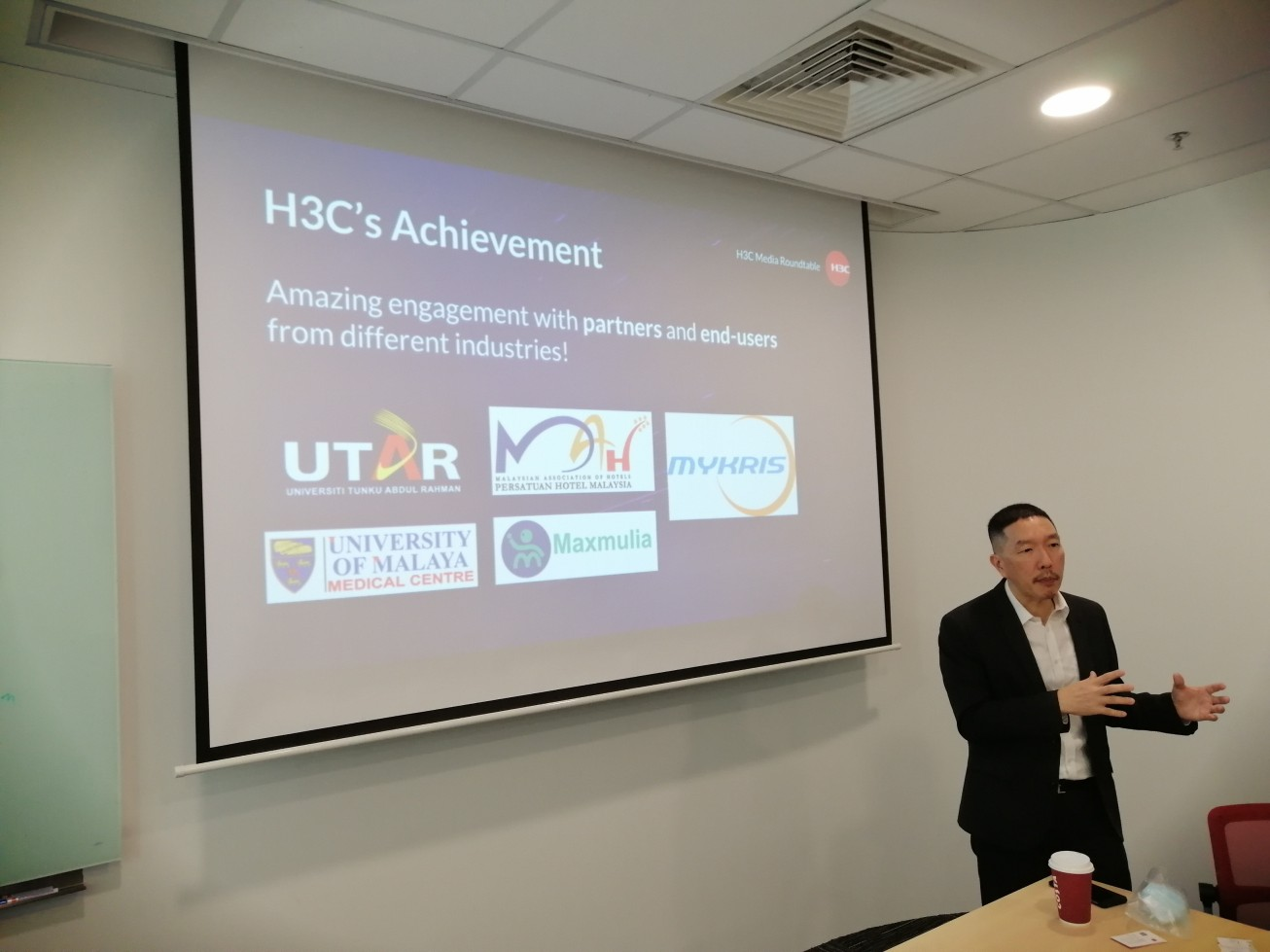“No one size fits all in digitalisation”, was the gist of the key message at the Fundamentals of Digital Transformation for Malaysia 2022 media round table at H3C Malaysia’s office in Kuala Lumpur on 26 January 2022.

According to H3C Malaysia’s General Manager, Rockies Ma, it is not enough to provide a customer with an information and communications technology system and standard applications.
Instead, one needs to thoroughly study each customer’s unique requirements, objectives, circumstances, technical capabilities, availability of suitable connectivity, as well as the local culture, religion, government policies, laws, regulations and so forth to be able to provide the customer with a technology solution and ecosystem specifically tailored for it.
The Beijing, China headquartered H3C has been in business for 18 years and provides a full portfolio of digital infrastructure products, spanning across compute, storage, networking, 5G, security and related domains, and also provides a comprehensive one-stop digital platform that includes cloud computing, big data, artificial intelligence (AI), industrial internet, information security, intelligent connectivity, AI vision, and edge computing, as well as end-to-end technical services.
Its digital infrastructure supports a wide range of applications used by government (smart cities, public services and so forth) telecommunication carriers, financial institutions, electrical power utilities, energy, transportation, education, manufacturing, retail, construction, cultural and other industries.
In Malaysia, H3C currently focuses on addressing the government, telecommunications & Internet services provider and the enterprise sectors.
Amongst enterprises, H3C focuses especially on the manufacturing, education and healthcare sub-sectors, where it sees more growth potential for digitalisation, than amongst banks, financial services and fintech companies where digitalisation is already quite mature. However, the company continues to supply these sub-sectors with its backend digital infrastructure.
In Malaysia, H3C currently focuses on addressing the government, telecommunications & Internet services provider and the enterprise sectors.

H3C’s major partners and end-users in Malaysia include Universiti Tunku Abdul Rahman, Malaysian Association of Hotels, University of Malaya Medical Centre, enterprise IT solutions provider Maxmulia Holdings and Maxis-owned corporate network security and business intelligence with quality digital services provider MyKris.
H3C currently has 11 representative offices worldwide and continues to expand its presence further across Asia, Europe, Latin America, CIS, Africa and other markets with the help of local business partners and their technical staff which H3C trains and certifies to implement its digitalisation infrastructure and solutions. In the past year, H3C has successfully certified a total of 488 partners and 830 engineers worldwide. It currently has certified 160 partners and 200 engineers in Malaysia.
“All technologies can be combined together and we want to educate the Malaysian market on what technologies are good, advanced and appropriate for them and assist our value-added partners and customers on how to build an ecosystem which everybody can understand what is behind it and can undergo some customisation to bring the right technology to the customer,” said Ma.
“Support is also important to help customers understand the technology so they can undergo digitalisation.”
Also, connectivity is very important for digitalisation.
“For example, in the office, we use WiFi and when outside, we use 4G or 5G, but if connectivity is poor, such as in rural areas, one cannot achieve full digitalisation. H3C had spoken to different organisations in Malaysia and 84% of them have either implemented, were in the process of implementing or were expanding their digital infrastructure.
For example, digitalisation in an office would include applications such as customer relationship management, sales force automation and any others running on the back-end and connected to computers over WiFi, as well as networked peripherals such as printers, scanners and so forth.
Software-defined network
“So they try to adopt a software defined network where there is no need to configure every piece of equipment but they can easily be connected to the network plug-and-play and many enterprises are looking at plug-and-play solutions,” said Ma.
Besides a single office or building, H3C’s digital infrastructure also integrates multiple offices and buildings at different locations, such as branch offices, retail-chain outlets, university and college campuses and so forth into a single software-defined network over fibre, metro-WiFi, 4G or 5G connections.
For instance, H3C had implemented such a software-defined network across a retail store chain with about 200 branches, some connected by fibre and others by 5G, and if an item which a customer is unavailable at one outlet, a staff member can check their inventory over network for the nearest outlet with that item and have it delivered to the branch the following day. “This kind of application is quite popular in Hong Kong”, said Ma.
“It enables retails chains to maximise their sales and inventory in each store, since it cannot carry all stock items in each store.”
Cost cutting versus greater efficiency
Rather than digitalisation, including Industry 4.0, artificial intelligence and so forth being used to cut costs by reducing businesses’ reliance on human labour, Ma believes they should see these as a means to achieve greater efficiency, reduce errors, improve service delivery and make digital services more user friendly. “Businesses must be clear about their objectives”, said Ma.
“If they think in terms of cost-cutting, they may violate the objective of what they want to achieve.” For instance, instead of looking at digitalisation in terms of labour cost reduction, a manufacturer could instead regard it as means to reduce errors and to increase the efficiency of their low-skilled labour force.
Whilst manufacturers are profit-oriented, governments are not. “Governments need to hire more people to sustain the economy, so governments need to look at digitalisation as means to improve service delivery to the public, which is user friendly for all,” said Ma.
Managed service providers
Ma has been following Malaysia’s 2022 Budget and the 12th Malaysia Plan closely and welcomes the government’s aggressive initiatives such as grants and other assistance to help the micro, small and medium enterprises (MSMEs) to digitalise.
“Technology is expensive but there are many managed service providers (MSPs) in Malaysia, so the MSMEs don’t need to invest a lot of money on digitalisation but instead can subscribe to ride on an MSP’s infrastructure,” said Ma.
Also, between buying all the hardware, software and applications and running their system in-house operated by their own staff and subscribing to a cloud-based services, where their data is hosted on some remote cloud, MSPs provide their clients with greater control of their data without having to invest in infrastructure and equipment.
“However, I do believe that the MSPs need more support from the government to be able to build more complete infrastructure to serve the industry.
The government cannot simply give the MSMEs money and expect them to digitalise all by themselves. China has been able to move very fast because of the government’s initiative,” said Ma.
Single Wholesale Network
When asked by one of the journalists about his views of Digital Nasional Berhad’s open-access, single wholesale network, Ma said that he believes it will provide widespread 5G coverage, even in remote rural areas, thus enabling the digitalisation of businesses there; when until now, the various profit-oriented 1G, 2G, 3G and 4G mobile network operators, with their own respective networks have not adequately served.
“The MSMEs want to know how convenient it is to use electronic-payment services such as Touch ‘nGo eWallet – a simple process which anyone can do, provided the shop has 5G or 4G coverage,” said Ma. “This will help businesses in remote areas to do business more easily, which is why the government has instructed Digital Nasional to build a very complete 5G infrastructure to cover everywhere.”
H3C Channel Kickoff
This media roundtable follows H3C’s launch of its annual H3C Channel Kickoff event in Malaysia with the theme of “Accelerating your business growth” the day before. The kickoff event highlighted opportunities for H3C’s partners to discover valuable information on leveraging H3C products and services in order to drive the success of their businesses. During the kickoff, H3C showcased five key goals to strengthen relationships with local partners.
The company aims to accelerate its investment in global business expansion, which includes setting up new regional offices and local business teams. It also honoured its Malaysian partners with the 2021 H3C Elite Partners Awards at the awarding ceremony.
In the ceremony, nine of its Malaysian partners were rewarded the Top Sales Elite Award, Industrial Market Development Award, Solution Sales Elite Award, Top Service Sales and Delivery Award, Best Collaboration Award and the Best Growth Award, as an appreciation to their strong support and continuous efforts in trusting H3C throughout their digitalisation journey.
One of the representatives of the award-winning partner commented that, “Throughout our partnership with H3C, we have benefited from their unparalleled services, mainly the H3C switches that have supported us by providing better connectivity for our company. We are very appreciative of H3C and we look forward to striving for another year working closely with H3C.”
H3C sees the key to successful business collaborations is to provide partners with a diverse range of product lines and end-to-end integrated solutions, increase overseas product certification, increase exploration on cooperation mode and joint solution development. At the same time, the company strives to accelerate its service capability by increasing its service coverage, providing a convenient and professional service support, and having a practical and systematic empowerment platform.
Another crucial goal is to accelerate the cultivation of digital talents through a customised empowerment system which aims to train and motivate lecturers. This method enhances partners’ practical capabilities of using H3C’s products and is also its goal in leading to the promotion of partners.
H3C’s success with local partners relies on the accelerated construction of digital platforms. In order to advance with its partners, the company has created multiple platforms including the PRM: Channel Business Lifecycle Platform, H3Club platform, individual training platform, individual incentive and empowerment platform to name a few.
As a digital solution provider, these platforms help partners and end-users to better understand H3C products and gain the interest of potential customers in working with H3C.
Ma thanked H3C’s partners and end-users, “We can see that digitalisation is the key driver in Malaysia’s ICT market. It has opened up many new business opportunities for small, medium and large enterprises. We will continue to support our partners through our ‘Partners First’ and ‘WinWin-Win’ strategy, along with a few new strategies and programmes to accelerate their business growth together. Throughout this journey, we are grateful to our partners for all their support. In this coming year of the tiger, we will be there to support them and let us strive for an advanced new growth together.”
H3C’s success with local partners relies on the accelerated construction of digital platforms. In order to advance with its partners, the company has created multiple platforms including the PRM: Channel Business Lifecycle Platform, H3Club platform, individual training platform, individual incentive and empowerment platform to name a few.
Meanwhile, Gary Huang, President of International Business and Senior Vice President of H3C said during the event, “H3C has become one of the fastest-growing ICT providers in the Chinese market. Our cloud business, smart industry and smart city business have also become the top three suppliers.
Apart from achieving great success in the Chinese market, the development of overseas markets is also recognised and growing rapidly”. The Channel Kickoff 2022 event in Malaysia is the first in a series of Kickoff 2022 events which will be held in countries such as Turkey, Thailand, Pakistan, Russia, Indonesia and Kazakhstan this year.








